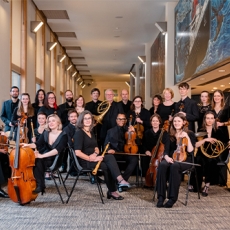JS Bach Matthew Passion - Dunedin Consort - Classical WETA
John Butt's is not the first Matthew Passion that uses OVPP-Paul McCreesh has already done that. But it is the first one to use the (ca.)1742 version that Bach presumably used in his last performance of the "big Passion" as Bach always referred to it. On the OVPP question: The sophisticated conjecture about Bach having, or even wanting, just one voice per part in his Matthew Passion can be followed in the writings of Joshua Rifkin. I have not yet read an argument (either pro- or contra-OVPP) that didn't willfully ignore information suggesting the opposite from their held beliefs, or massage the evidence to necessarily support their side when it might support it possibly at best. I find it curious, though, that Bach should have wanted the big Passion" sung with one voice per part (OVPP), while the St. John Passion's surviving performing material indicates at least two voices per part.
Ultimately I don't care-as long as the performance is enjoyable or revealing. The Historically Informed Performance movement has brought us many such performances and should be welcomed by all music lovers with open arms. As long as its ‘extreme fringes' don't become the new orthodox, inflexible standard by which to perform Bach (or all baroque music) which would leave some of the greatest music ever written the prerogative of specialist groups, HIP only enriches our musical experience. John Butt notably, laudably states precisely that in his generally incisive liner notes: "Trying to follow Bach's vocal scoring and the instrumentation of his last performance is not done in the name of a sort of pious literalism that condemns every other approach to the realm of inauthenticity... [H]istorical details might begin to seem rather trivial if the performance reveals this work to provide a musical experience that is almost on the threshold of what is emotionally bearable." He legitimately hopes that his performance provides that experience, but the ambition is expertly clad in humility.
Upon first listening, the Dunedin Matthew Passion did precisely what John Butt must have set out to achieve. Hugely impressive for its combination of thrust and clarity, the invigorating play of the Dunedin Consort & Players manage to have instrumental and vocal strands appear where all-too often they become part of a greater ‘sound'. This is nouvelle cuisine compared the cuisine classique of decades past or the musical curry that those conductors have made of the Matthew Passion, who performed in the tradition of the massive oratorios. Outstanding, apart from the ever lively playing, are also the superb basses (a sonorous, richly wonderful Jesus in Matthew Brook, Brian Bannatyne-Scott who is simply terrific in "Gerne will ich mich bequemen", Roderick Bryce who makes Judas rather appealing), and Evangelist Nicholas Mulroy-eminently worth hearing.
Unfortunately, there are also a significant amount of shortcomings that become increasingly obvious with repeat listening. For one, the female voices are less pleasant than the male, notable in the opening "chorus" where they stand out unpleasantly. Particularly unpleasant is alto Clare Wilkinson. Right off the bat the first "kla-a-a-a-a-gen" (note esp. bar 24) is most unfortunate sounding. Soprano I Susan Hamilton is better, but sounds-for better or worse-like a treble most of the time. The interpolating "Wen, Wie, Was, Wohin?" questions from the second choir sound more like pecked interruptions than questions that stipulate the answer of the first choir.
Jesus' aria "Trinket alle daraus; das ist mein Blut" is fleet, and has the dance-y touch to it that makes this performance so airy, but at the cost of being less touching than it could be. There are also the odd moments of funny accentuation in the Butt recording-for example "Aber nicht wie ich WILL, sondern wie du WILLST" (instead of "Aber nicht wie ICH will, sondern wie DU willst"). But then "Welchen ich kuessen werde, der ists!" is done extremely well-both as regards the pronunciation and the way it is spoken, more than sung. The orchestra and combined voices in "Sind Blitze, sind Donner..." manage for something that is terribly exhilarating, as long as it is not dissected. Here, like in many parts of this performance, the whole becomes much more than the sum of its parts, simply because a few of the parts taken on their own are rather un-lovely. Ironically the Butt-Passion, offering so much focus and detail, moves from "interesting" to splendid only once you take the focus away from it. In that sense, ‘just listening to it' is a far greater joy than reviewing it, score in hand. If you don't get stuck quibbling on these various issues (chances are you won't on hearing it the first few times), the surprising and fresh sweep of the opening carries you with the performance far into part one.
The musical difference of the 1742 version to BWV 244 is insignificant (compared to BWV 244b or some of the different St.John Passion versions). The difference in scoring (harpsichord instead of organ as the basso continuo instrument for the second choir-in any case a change more likely born out of necessity than desire) has been replicated in plenty other recordings, HIP and non-HIP alike. The recording quality and sound of this Linn disc is, as usual with this audiophile label, stupendous.

